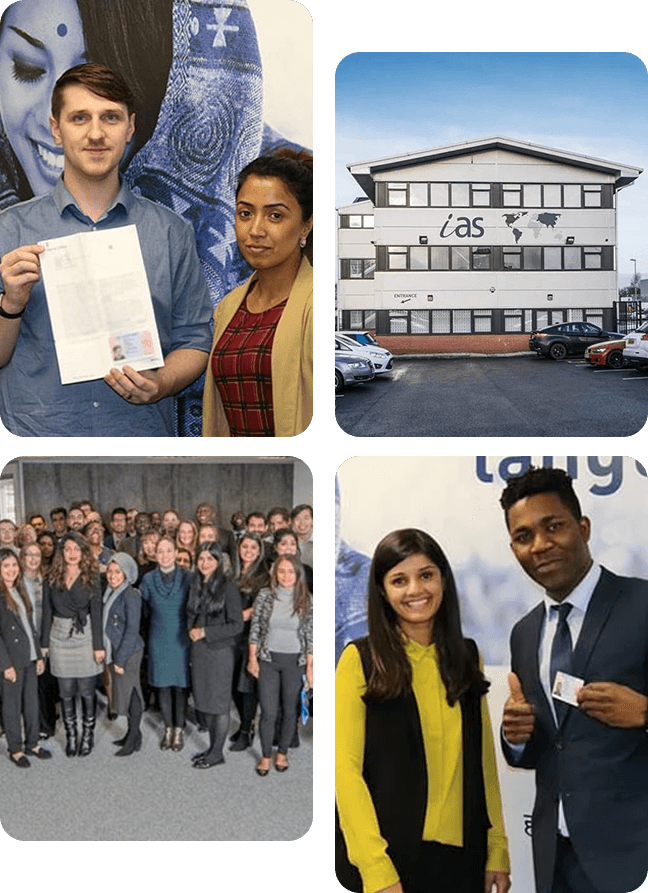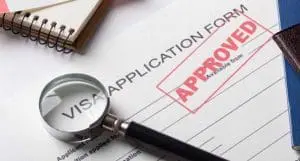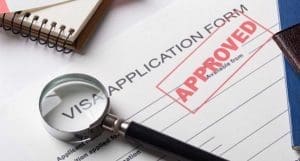Irish Citizenship by Naturalisation
Nigerian nationals who have been residing in Ireland for a certain length of time may be entitled to apply for Irish citizenship by naturalisation.
To learn more about the citizenship by naturalisation process and for immediate help with your immigration situation, call us at +2342013306361. We can help you in person, via the phone, or online.
Request a call back from our immigration experts
Benefits of Choosing IAS‘ Ireland Immigration Lawyers
When it comes to obtaining an Ireland visa or permit, IAS Ireland immigration lawyers are well-equipped to help you.
With IAS’ track record of successfully helping clients visit or immigrate to Ireland successfully, we can help you achieve your goal.
Our dedicated immigration lawyers provide our services through a comprehensive and personalised approach. With IAS, you enjoy:

Compassionate support from an experienced immigration lawyer dedicated to your success



Support in gathering supporting documents and completing a high-quality application.



Confidence that your case is being handled by an experienced team.



In-house document checks done by lawyers who are well-versed in Ireland immigration matters.
Services we Provide
What is Irish Citizenship by Naturalisation?
Naturalisation is the process through which a non-Irish national can apply to become an Irish citizen, provided they meet specific eligibility requirements. It is the primary option many foreigners will take to obtain citizenship, as other routes, such as citizenship by descent and birth, require applicants to have Irish ancestry or familial ties.
The Irish Nationality and Citizenship Acts of 1956 set out the rules governing Irish citizenship. According to the regulations, one fundamental criterion for naturalisation is meeting a reckonable residence period.
Applicants must have lived in Ireland legally for at least five years, although, in some cases, three years of reckonable residence may be sufficient to qualify for citizenship. In addition, the Minister for Justice, acting through the Immigration Service Delivery (ISD), has the final authority to grant or refuse naturalisation after considering several factors.
Irish citizenship offers a range of benefits. Some of these include the ability to live, work, and study in Ireland and the EU without immigration limitations and participate in the State’s democratic process.
Who is Eligible for Citizenship by Naturalisation?
The Irish Nationality and Citizenship Act 1956 and its subsequent amendments outline the legal requirements for naturalisation. To apply for Irish citizenship through the naturalisation process, you must be any one of the following:
- An adult who has lived legally in Ireland for five years
- A person married to or in a civil partnership with an Irish citizen and has lived in Ireland for the last three years.
- An adult applying on behalf of a minor who meets specific requirements.
- A refugee who has lived in Ireland under the International Protection Act 2015 for the last three years.
Each category of people has specific requirements they must fulfil. However, irrespective of your category, you must:
- Be able to prove your identity
- Show that you have legally lived in Ireland for the reckonable residence period that applies to you.
- Meet the required total points on the citizenship scorecard system.
Requirement for Adults Who Have Lived in Ireland for Five Years
If you are an adult who has been living in Ireland continuously for five years, you may be eligible to apply for citizenship if you:
- Are 18 years of age or over
- Can prove your identity
- Meet the relevant conditions for residence, including:
- Having lived continuously in Ireland for an entire one-year period right before you applied
- Having a total residence in Ireland of four years during the eight years immediately before that one-year period.
- Have proof of residency in Ireland for every year of residency claimed
- Agree to attend a citizenship ceremony and make a declaration of fidelity
- Meet the good character requirement.
Note that in the one-year period where you must be in Ireland immediately before you apply, you can be outside the country for up to 70 days. The days you leave and arrive back in the State are not counted as absences.
Additionally, you may be allowed an extra 30 days outside Ireland if you leave due to exceptional circumstances, such as health or employment reasons or the loss of a loved one. In total, you must have lived in Ireland for five years within the past nine years to qualify.
Calculating Reckonable Residence for Adult Applications
If you are a non-EEA, non-UK, or non-Swiss national, you can count your reckonable residence as any time you spent in Ireland as a/an:
- Employment permit holder with a Stamp 1 or Stamp 4 permit
- Dependent of an employment permit holder or other legal resident (usually with Stamp 3)
- Spouse or partner of a Critical Skills Employment Permit holder, General Employment Permit holder, Inter-Country Transfer employment permit holder or on the Third Level Graduate Scheme (with Stamp 1G)
- Stamp 5 Permit holder.
You will not be allowed to count any time you spent in Ireland:
- On a student visa (usually with a Stamp 2 or Stamp 2A permit)
- While you were undocumented
- While you were an international protection applicant.
You can calculate your reckonable residence on the Immigration Service Delivery website to ensure you meet the residency requirement. Additionally, as long as you’re from outside the EEA, UK, and Switzerland, you must send a printout from the calculator and your accumulated immigration permission stamps with your application.
Considerations for Young Dependent Adults
If you are a young adult dependent on a parent’s visa but do not meet the residence period, you can use your parent’s reckonable residence in your calculation. However, you must meet the other criteria for adult applications and the following additional requirements:
- You are aged between 18 and 23 when you make your application
- You entered Ireland legally as part of a family unit
- You are currently in secondary school or went straight from school to a third-level college in Ireland.
- You are continuously dependent on your parents
Considerations For EEA/UK/Swiss Nationals
If you are a UK, EU/EEA, or Swiss national, all periods of residence in Ireland will count towards naturalisation.
You do not need to submit a copy of your online reckonable residence calculation when submitting your application. You only have to show documentary evidence of your history in Ireland as proof that you meet the reckonable residence requirement.
Note that you must have been a citizen of the UK, EU/EEA, or Switzerland for more than five years before you can apply for Ireland citizenship by naturalisation via this option. Otherwise, you must apply as a non-EU/EEA, non-UK, or non-Swiss national.
Requirement for Spouses and Civil Partners of Irish Citizens
If you are married to or in a civil partnership with an Irish citizen, you may be eligible for Irish citizenship through naturalisation if you meet the following requirements:
- You are 18 years of age or over
- You can prove your identity
- You have been married to or in a civil partnership with an Irish citizen for three years or more.
- Your marriage or civil relationship is genuine and enduring.
- You must be living with your spouse or civil partner on the date you apply for citizenship and on the date you gain citizenship.
- You have lived legally on the Island of Ireland (which comprises Ireland and Northern Ireland) for three out of the last five years before applying. This must include 12 months of continuous residence immediately before your application date. Absences up to 70 days and an additional 30 in exceptional circumstances are permitted within this year.
- You have proof of residency in Ireland for every year of residency claimed
- You intend to reside in Ireland after you become a citizen
- You are willing to attend a citizenship ceremony and make a declaration of fidelity
- You are of good character.
As the spouse or civil partner of an Irish citizen, you can count the time you’ve spent living in both the Republic of Ireland and Northern Ireland as part of your reckonable residence period. Additionally, you’ll be required to send proof of your Irish spouse or civil partner’s residency.
Requirements for Minors
In line with the Irish Nationality and Citizenship Acts, minors under 18 and not married are not allowed to make an application for citizenship for themselves. Only a parent, legal guardian, or an individual legally acting on the child’s behalf ‘in loco parentis’ can make the application.
If you are applying for citizenship by naturalisation for a child, you must be 18 years or above. Additionally, your child must be under one of these categories:
- A child born in Ireland after 1 January 2005 who did not qualify for citizenship at the time of birth but has three years of reckonable residence.
- A child with at least one parent who is already an Irish citizen by naturalisation.
Minors Born in Ireland After 1 January 2005
Before 1 January 2005, individuals born in Ireland were automatically considered Irish citizens, regardless of their parent’s nationality. However, this automatic citizenship entitlement changed after the State voted to change the constitutional right to citizenship.
Thus, any child born on the island of Ireland on or after 1 January 2005 can only become a citizen based on:
- A parent’s residency history in Ireland
- A child’s residency history in Ireland. The child must have lived continuously in Ireland for one year right before applying, and in the eight years before that, they must have lived in Ireland for a total of two years.
Minors with Naturalised Parents
You can apply for citizenship on your child’s behalf if:
- You became an Irish citizen by naturalisation
- Your child has resided in Ireland for at least three years before the application.
Requirements for Refugees
Nigerians living in Ireland as refugees under the International Protection Act 2015 can naturalise as an Irish citizen if they meet the following requirements:
- They are 18 years or older
- They have a declaration as a refugee from the Minister for Justice in Ireland.
- They can prove their identity.
- They have lived in Ireland for the past three years and have proof of residency.
Documents Required for Ireland Citizenship by Naturalisation
To apply for Irish citizenship by naturalisation, you must submit some specific documents. These documents must be true copies certified by a practising lawyer, a Commissioner for Oaths, or a Notary Public. Additionally, they must be in English or Irish language.
Note that state-issued documents, like marriage certificates, must be apostilled by the Minister of Justice in the country they were issued. Our lawyers at IAS can help you prepare and certify your documents. Call us at +2342013306361 to discuss your immigration needs.
Here’s a breakdown of the documents you’ll need:
Proof of Identity
Each proof of identity document is assigned a score, and you must reach 150 points in total, either with a single document or a combination of more, on the identity scorecard to establish your identity. Here are some acceptable documents:
- A colour copy of the biometric page of your Nigerian passport (150 points)
- A copy of your Irish Residence Permit (IRP) Card (75 points)
- A copy of your Nigerian passport expired more than 365 days (50 points)
- A copy of your Nigerian National Identify document (50 points)
- A copy of your Public Services Card (25 points)
Proof of Residence
You must provide proof of residence documents that reach the required score of 150 points for every year of residency claimed. These documents are classified as Type A and Type B documents. Type A documents have a score of 100, and they include the following:
- Bank statements
- Copy of P60
- Employment Detail Summary
- Department of Social Protection Annual Contribution Statement.
Type B documents have a score of 50 points each, and they include the following:
- Rent agreement
- Credit card statement
- Phone or utility bill
- Annual mortgage statement
- Medical Practitioner Employment History
Dependent young adults can also provide a letter from their school or college showing their date of registration and attendance as one of their proof of residence.
Additionally, note that an adult applying for a child born in Ireland after 1 January 2005 must also score 150 points in each of the years of proof of residency.
Furthermore, refugees who do not have access to their Nigerian passports are exempt from submitting one. Instead, they can submit their Irish-issued travel documents, a letter confirming refugee status, and a passport affidavit to meet the required threshold.
Other General Documents
In addition to proof of identity and residence, you must provide the following documents:
- The online application form
- A criminal record certificate
- A printout from the reckonable residence online calculator (for all EEA, UK, and Switzerland applicants).
- Two recent colour passport-sized photographs with the date and your signature on the back of each.
Additional Documents for Spouses and Civil Partners of Irish Citizens
If you are in a civil partnership with or are married to an Irish citizen, you must provide the following documents:
- Marriage or civil partnership certificate
- A sworn affidavit completed by the Irish spouse/civil partner
- Proof of the Irish spouse or civil partner’s residence
- Proof of the Irish spouse’s/civil partner’s entitlement to Irish citizenship with any of the following:
- Birth certificate if born in Ireland
- Foreign birth register entry
- Parent’s birth certificate if they were born in Ireland
- Naturalisation certificate
- Irish passport page with photograph
Additional Documents for Minors
If you are applying on behalf of a child, you must provide the following documents:
- A copy of the child’s birth certificate
- School letters from each school your child attended or a letter from Túsla Educational Support Service (TESS) if the child is homeschooled.
- A copy of the court appointment documents, if you are a legal guardian
How Do I Apply for Citizenship by Naturalization?
You can apply for citizenship by naturalisation online or by paper form.
To apply online, you must create an account on the Immigration Service Delivery’s website and complete the online application form relevant to your eligibility. For instance, for adult applications, you’ll fill out Form 8, but when applying on behalf of a minor, Forms 9, 10, and 11 may apply depending on the child’s circumstance.
Then, you should upload your supporting documents and tick the statutory declaration box. Afterwards, you must pay the citizenship application fee via the online portal.
If you cannot access the online service, contact [email protected] to request a paper form. You’ll then need to send the application fee through a bank draft payable to the Secretary General of the Department of Justice.
What Happens After I Apply?
After you apply for citizenship, you will receive an application number and a link to complete an e-vetting application. The e-vetting process will allow the Citizenship division to determine if you have any criminal offences and that you meet the good character requirement.
Once you’ve completed the online vetting application and the relevant authorities have reviewed it, the ISD will process your citizenship application.
They will contact you if they require additional information or clarification during this processing period. Also, if your personal information changes, such as your home or email address, you must contact the ISD in writing.
The processing period for most applications is usually within 19 months, and the ISD will notify you of their decision. If your application is successful, you must pay the citizenship certification fee and return your IRP card if you have one. Then, you’ll receive an invitation to attend the citizenship ceremonies.
However, if your application is unsuccessful, you will be given a reason for the refusal. Note that you cannot appeal this decision. You can either submit a judicial review if you feel that the ISD’s decision was unfair or submit a fresh application.
The Citizenship Ceremony
The final step in the naturalisation process is to attend a citizenship ceremony. The ceremony includes taking an oath of loyalty to the nation. Afterwards, citizenship will be conferred on you.
You will receive your certificate of naturalisation by post within a few weeks after the ceremony. Then, you can apply for your Irish passport. Note that minors are not allowed to attend a citizenship ceremony. They will receive their naturalisation certificate by post.
Becoming an Irish Citizen Through Naturalization
Naturalisation is one of several pathways to Irish citizenship. It allows foreign nationals who have lived and integrated into Irish society to become citizens of the State.
As such, individuals who would not have qualified for citizenship by birth or descent can gain Irish nationality rights. However, naturalisation typically requires a longer residence period compared to other routes.
When you become an Irish citizen, you will be entitled to all the rights of an Irish national. This includes the right to vote in a general election and be elected in government and access to public healthcare, education, and other social benefits. You’ll also be able to serve on a jury and receive diplomatic assistance from an Irish or EU embassy when you’re abroad.
With your Irish passport, you can live and work in any EU member state and travel to 150 other countries visa-free.
One key requirement for citizenship by naturalisation is the intention to continue residing in Ireland after you become a citizen. Otherwise, you might lose your citizenship. If you intend to live abroad temporarily, you should inform the ISD and complete Form 5, allowing you to keep your citizenship while you’re away.
The Cost of Irish Citizenship by Naturalisation
The application fee for citizenship by naturalisation is €175. If your application is approved, you must pay a citizenship certification fee before attending the ceremony. Here’s a breakdown of the cost of the certification fee:
- Adults: €950
- Minors: €200
- Widow, Widower, or Surviving Civil Partner of an Irish citizen: €200
- Recognised refugee or stateless person: Free
After the ceremony, you must pay a fee to apply for your Irish passport. Here’s a breakdown of the passport cost:
| Passport Type | Online | Postal Service via AnPost |
| Standard Adult 10-year passport | €75 | €80 |
| Large 66-page, 10-year passport | €105 | €95 |
| Standard Child 5-year passport | €20 | €30 |
| Large 66-page, 5-year passport for a child | €50 | €55 |
| Passport Card | €35 | Not possible |
Note that children applicants applying online will pay an additional €5 to get their documents posted. Additionally, all applicants applying via the AnPost postal service must pay an administrative and delivery fee of €9.50.
How IAS Can Help Nigerian Citizens with the Irish Naturalisation Process
The process for naturalising as an Irish citizen can be quite complex due to the varying and strict eligibility requirements. But with expert guidance from an Irish immigration lawyer, you can streamline the journey and have a successful outcome.
Our lawyers at Immigration Advice Service (IAS) are experts in Irish immigration laws. We offer various services tailored to help Nigerian immigrants in Ireland throughout the naturalisation process.
We are available both online and in-office to help you understand the eligibility criteria, residency requirements, and documentation you require. Our lawyers will also help you prepare and submit your application.
If you’ve recently received a rejection in your citizenship application, we can help you apply for a judicial review and overturn the decision.
To speak with an IAS lawyer, call +2342013306361 today.
Table of Contents
Table of Contents will appear here.Legal Disclaimer
The information provided is for general informational purposes only and does not constitute legal advice. While we make every effort to ensure accuracy, the law may change, and the information may not reflect the most current legal developments. No warranty is given regarding the accuracy or completeness of the information, and we do not accept liability in such cases. We recommend consulting with a qualified lawyer at Immigration Advice Service before making any decisions based on the content provided.
Frequently Asked Questions
The most common reasons why a citizenship application may be denied include:
- Not reaching the 150 points on the identity and residence scorecards and without an affidavit explaining why.
- Not completing all the relevant sections of the application form.
- Not including all relevant supporting documents
- Submitting a poor-quality document.
- Providing false information in your application.
- Not meeting the requirements for citizenship.
For first-time applicants, online passport applications are processed within 20 working days. Applying by post should take at least eight weeks, not including postage time.
Yes. Ireland permits dual citizenship, meaning you can become an Irish citizen without renouncing your Nigerian citizenship.


What our clients are saying
How our UK Immigration Lawyers can help
At the Immigration Advice Service our lawyers specialise in a wide range of UK visas, nationality and asylum applications and have represented clients in various successful complex and high-profile cases.




























